When Scam Victims Turn To The Dark Side
The Same Problems That Led Scam Victims To Be Scammed Are Still At Work In Them
WARNING: Just because you are a scam victim does not make you an expert at cybercrime nor will it instantly make your decision-making reliable
The purpose of this article is not to blame, shame, or condemn, but to help recent scam victims understand that their after-scam decisions have just as many consequences as their decision to let their scammer in.
Who Are We (SCARS) To Talk About This?
SCARS is a victims’ assistance and support organization. We have helped millions of scam victims learn about scams and start on the path to recovery – literally almost 9 million (2023).
In addition, we have directly helped thousands recover through our own support groups. We are also the only incorporated nonprofit registered online crime victims’ assistance organization in the United States supporting victims worldwide – we literally wrote the book on scam victim recovery. Plus, our leadership has 32 continuous years of experience working to help victims of online crime.
We have seen it all and help scam victims find the better path, but sadly many victims will rush headlong over the cliff into continuing destructiveness.
This article is intended to help victims understand the directions they have or may yet take. These directions avoid, derail, or prevent your recovery.
There are things that some victims do after a scam that are difficult to reconcile and this article is about these
This is going to be an article that will be harsh, pulling no punches, and judgmental. Because behavior that harms other victims is not acceptable whether done by a scammer or by another victim. It will not apply to most of you, but you still need to know this because you will encounter them.
Scam Victims First Fails
First, let’s talk about the inherent challenges facing recent scam victims because most of the lasting mistakes start right after the scam ends.
- Many scam victims are in a panic and start making decisions from a position of fear. Obviously, that is not the mindset to start planning the next steps or thinking clearly.
- Other scam victims are enraged and hate so much that all they see is the enemy and want them dead by whatever means is possible. Anyone that gets in their way or disagrees with them is also the enemy.
- Others are envigorated following their scam – they have something of a revelation – that they personally are going to stop all the scammers and only they know the answer. This is also called Savior Syndrome.
- Still, others find themselves in various delusional states and act on them. We would hope they find help but many do not.
- Also, many victims will fall into a state of denial and while this is harmful to themselves and their immediate friends and family, it is not really harmful to other scam victims directly – but it is indirectly.
It is during this initial period that many of the victims that are unable to recover or fall into more severe states emerge. We hope that if you see these tendencies in yourself that you will work to control or overcome them, seeking professional help as needed. If you see these in others be cautious as the can drag you down just like a lifeguard saving a drowning swimmer.
The Longer Scam Victim Fails
Many scam victims after the scam embark on long journeys that can extend for years. These are the missionaries that channel their pain or anger into missions to save or guide other victims (Saviors.) Many believe that only they know the answer and everyone else is an enemy. Many believe that victims should only follow them.
They are frequently vigilantes too who believe that no one is doing anything and they will stop scamming all by themselves.
Still, others, transform into cynical scam victims who delight in playing with scammers. Including unethical scam baiting.
While it is true that there are many who have very useful skills that they have acquired throughout their lives, the majority of those that fall into these traps do not. They rely on their conviction, obsession, or fantasy (magical thinking,) that they are the right person with the right ideas and do not have to listen to anyone else because they just know what to do. If they were in other walks of life they would live in a bunker or wear tinfoil hats!
7 DEADLY SINS
When we say deadly sins we mean actions or beliefs that cause harm to them and others.
Everyone has the right to choose how they recover and react after a traumatic experience. However, they do not have the right to hurt others or get in the way of another scam victim’s recovery or real solutions.
In fact, many of these actions are illegal in many Western Countries.
The Deadly Seven
Here is our list of the Seven Deadly Sins that a subset of victims engage in after they have been traumatized by a romance scam:
- Messiahs (Saviors) & Cult Anti-Scam Group Creators – capturing other victims with urban legends, half-truths, and destructive methods
- Haters & Trolls Attacking All That Disagree – only they are right
- Vigilantes Believe No One Is Doing Anything so they have to do it
- Scam Baiters – that turn scammers into toys or a sport
- Trackers & Stalkers – Of The Face In The Photo – invading the lives of other victims
- Panicked Victims that cling to other victims looking to be saved
- Mules & Moles – still believing in their scams and serving their scammers
We have written extensively on each and every one of these topics in the past and will again as the continuing need arises. We will not go into detail about each of these here except to explain briefly why they are harmful to others.
Messiahs/Saviors & Cult Anti-Scam Group Creators
Almost every day another victim believes they are an instant expert and creates yet another anti-scam group. They create a page or a group on social media and start plastering it with mostly useless information, exposing and shaming scammers, and even engaging in scam baiting. Worse still is that because of their lack of skill and knowledge, they profoundly increase the trauma for many victims by their never-ending focus of forcing victims to view an endless stream of scammer photos. The majority of victims are traumatized after a scam and leading them to believe that “exposing” scammers to the public will stop scamming is ridiculous. Instead, it continuously forces other victims to relive their experience in these photos which can cause or trigger other effects that can limit or delay their ability to recover, or worse transform them into vigilantes or haters. Repetitive exposure to trauma can also lead to PTSD.
Victims Assistance is a profession with formalized training, certifications, and registrations in most Western Countries. The United States Department of Justice is the leader in the field through its Office of Victims of Crime and its sponsored organizations such as the National Center for Victims of Crime (which SCARS is registered under) as well as the National Organization for Victims’ Assistance (that has awarded SCARS some of their highest awards.) The amateur messiah/savior groups are not registered, not trained, not professional, and are simply harmful in most cases. SCARS maintains a strong set of ethical standards and a Code of Conduct for all of its Member Groups. Amateur and fake groups to not!
Scam Victim Haters & Trolls
Many scam victims succumb to their own hate for scammers and fall into a permanent state of anger against anyone that does not follow the same beliefs that they have.
Often they are not even aware of their anger, but it is their default emotional state. These victims need to see trauma counselors or therapists to help them manage their trauma and overcome their anger.
Frequently they will also create their own anti-scam “ScamHaters” groups and wage war against others that properly help scam victims. The main problem with them and the messiahs is they tend to appeal to recent victims’ need for action and justice, and as such draw them into these fake amateur groups which can profoundly affect the recent victim’s ability to recover properly. In addition, their constant hate and battles against more rational groups or organizations that are making real progress create a general condition of confusion and can slow real progress against ending scamming overall.
Scam Victim Vigilantes
A variation on the haters and messiahs are the Vigilantes. These are victims that decide they are going to be the investigators, enforcers, judges, and jury of scammers. Unfortunately, it is also dangerous for anyone that gets in their way.
There is nothing wrong with investigating your own scam – within reason – though it can hold scam victims back from their own recover after the crime. What we mean is that after you have been scammed you want to know all you can about what happened to you – or at least you should. You may not understand how it happened and you may feel a sense of duty to help prevent it – that is admirable. However, if it is driven by rage or hate it becomes something altogether different. It becomes destructive and harmful to others, and in many cases harmful to yourself. Just remember, no new victim is in a position to really help others yet – they have to substantially recover themselves before they can help others.
It is important to recognize that there are limits to what you can do. By wanting to investigate these crimes, victims have actually attacked the real people pictured in the stolen photos or others have harassed law enforcement for not doing enough when their hands are tied by international law and treaties.
Vigilantes are over the top in terms of their reactions to a process that is now accelerating. Instead of being part of the solution, they chose to let their limited experience and knowledge make them a barrier to real progress.
Scam Baiters (Online or On-Phone Vigilantes)
We have published extensively on Scam Baiters in the past, but a brief review is in order as a part of this article.
Scambaiters play with scammers based upon the belief that wasting a scammer’s time will reduce the number of victims or somehow magically cause scammers to give up. It is a complete self-conceit – meaning that it is a fantasy.
Scambaiting accomplishes NOTHING useful. If it did then why has scam baiting not resulted in any meaningful arrests or even a reduction in scamming? It simply is nothing more than masturbation by the scam baiters, and worst the scambaiters are actually spending their time training scammers to be better at their communication skills. The level of time that scam baiters spend with scammers in conversations improves the language skills and knowledge of the individual scammers and thus allows them to be more effective in scamming others. The result? Scambaiters create better scammers!
Scam baiters have turned the activity into a sport. They have clubs and groups devoted to baiting scammers and sharing their trophies (chat or email sessions). It is a self-indulgent – self-gratification and nothing more. Of course, they hate our organization because of our position on the subject. Our position is that if you engage in fraud online regardless of the goal you are also a fraudster. You cannot use the tactics of scammers without it rubbing off on you, and this certainly does nothing to help them or others recover from the trauma of a scam. However, we do admit it makes good comedy!
Worse still, scambaiters attack desperate scam victims looking for solutions – bot for justice and to recover their money. Thes scam victims get trapped by the mistaken idea that scambaiting can help them somehow! But all it does is derail scam victims from getting the real help they need. This is the equivalent of a cancer patient using homeopathic treatments instead of real cancer treatments.
While the police may not prosecute for it, scam baiting is engaging in online fraud against scammers and is certainly unethical unless done by law enforcement.
Learn more about Scambaiting:
- SCARS Position Statement Against Scambaiting
- Scambaiting & The Great Lie! [UPDATED]
- SCARS Special Report: Scambaiting – You are Only Hurting Yourself
Trackers & Stalkers
WARNING: Tracking down and contacting the face in the photo is a crime called cyberstalking. Learn more here
One of the things that recent victims do that is profoundly disturbing is tracking down the real person (the face) in the photos that were stolen and used to scam them.
In the scam victim’s state of panic and confusion, this can be somewhat excused briefly. It is arguably natural to be curious about who’s face was in the photo that they formed an attachment to – a relationship with. They may want to do Google searches to identify the real person in the photo. But it is important to know for a fact – that the victim did not and does not have a relationship with that person – only with their photo. This is where curiosity can turn into an obsession or delusion and even into criminal behavior.
Why would someone believe that it was acceptable to stalk a real person who is another victim. and invade their life? Many victims use the excuse that they just want to let the person know that their photos are being used by scammers – however, our experience is quite different. We have found that many victims use this as an excuse and that their real goal, even if they do not realize it, is to see if somehow magically when they meet the face they fell in love with that the other person will feel the same way. Of course, this is nonsensical.
It is triggered by the panic that sets in after the scam and fed by a desperate substitute fantasy that if you can just see that person somehow everything will be alright. But it will not. Not only will there be no relationship “pot of gold” at the end of the rainbow but the stalker is stomping through the life of another victim. The face in the photo is just as much of a victim – in this case of impersonation – and every bit deserving of their own privacy. In addition, this kind of stalking is actually a crime in many cases.
More importantly, the impersonation victims already know they have had their identity and face stolen by scammers because hundreds or thousands of other victims cross the line and have stalked and tracked them down. Can anyone imagine what that is like for them and their families?
Panicked Scam Victims
It is natural that after a scam victims are afraid and do not know where to turn. Fear can become severe. This is one of the reasons that so many victims take their own lives every day. However, it also becomes a problem when a victim attaches themselves to other victims obsessively.
We are very sympathetic about this, but just remember that other victims are going through their own issues and while they may initially accept connections it doesn’t mean they can or will save you, especially financially. We have seen many victims start to work in a group they have joined begging for help or money.
The amount of money some victims send to their scammers is staggering. Some send more than a million dollars, and so many in the tens of thousands. Dealing with the reality that a victim actually did that and then the aftermath of debt or potential homelessness is overwhelming. But other victims are dealing with the same things too and should be respected.
The proper course of action is to explore every available option the government and private means allow. There are programs that can provide financial assistance to victims of crimes, including mental health programs as well. This is where it is appropriate to turn to, but not to turn into a burden for another victim. This should always be kept in mind.
Mules & Moles
Of course, Mules and Moles are victims that do not yet know they are victims – at least in most cases.
We mention them because not only is this one of the deadly sins that seriously affect other victims, but it is also a problem for them when they discover they were the victim of a scammer and helped the scammer harm others. This is a difficult thing to realize and so many simply hide in denial, which in its own way causes further harm to new victims because it prevents or delays the identification of the scammer and their victims.
A Mule may have aided a scammer without knowing but once they discover the scam have a duty to report it to the police so they can help the other victims involved. Hiding the dirty little secret only allows the scammer to continue to victimize people without interruption. This has not only made them an accessory to the original crime but an accessory after the fact for hiding it.
Moles are more active participants in carrying out the instructions of the scammer by knowingly causing harm to others. They may not know they are being scammed, but by acting for the other person (the scammer) to spy on others – they have crossed ethical and legal lines as well.
Moles and Mules are the most difficult to help after the scam because of their more active participation for the scammer. This brings a heavier level of guilt and shame, but without the full realization and willingness to report the crime, they only further compound it.
Path To Recovery
We have written extensively about the path victims should take towards recovering after a romance scam, but the most essential element or act is simply acceptance.
Each victim has to accept what happened to them and that they are not anyone’s savior. They are a victim in need of help to recover – either an organization like SCARS or local counseling – but recovery is a process and it is hard to follow on your own. Once a person is substantially recovered and healed then you can turn to help others and they will welcome your help, but not before. Doing it before you are ready will only cause more harm than good.
We strongly recommend that scam victims find a trauma counselor or therapist to help them. In addition, we recommend our SCARS Self-Help Books (see below)
A Role You Can Play
One of the roles that recent victims can play that truly can help others is by sharing their stories. Being honest and open about what happened to you will help others understand and come forward as well. This is not being a savior, it is just being human and putting yourself there! If you do, you will be surprised at how much support will come your way! Just remember, not everyone that reaches out to you will have your best interest at heart, some will be saviors and vigilantes and haters more interested in using you than helping you, so be on guard always! But it is still worth doing because it helps you the most.
Always Feel Free To Contact Us
WE MAY NOT TELL YOU A FAIRYTALE BUT WE WILL ALWAYS TELL YOU THE TRUTH
There are SCARS Groups and SCARS Partner Groups around the world to help you. We are also here to listen and guide you to where you may find help.
To join a SCARS Support & Recovery Group – a free, confidential, and private service of SCARS – visit support.AgainstScams.org to sign up.
For those who took the time to read through this, we wish you all the very best, and we hope you understand that our goal is to see every victim recover their former selves again, but when they engage in behavior that harms others it needs to be called out.
We hope you can find your path and just know that we will be here if you want or need us!
-/ 30 /-
What do you think about this?
Please share your thoughts in a comment below!
Statement About Victim Blaming
Some of our articles discuss various aspects of victims. This is both about better understanding victims (the science of victimology) and their behaviors and psychology. This helps us to educate victims/survivors about why these crimes happened and to not blame themselves, better develop recovery programs, and to help victims avoid scams in the future. At times this may sound like blaming the victim, but it does not blame scam victims, we are simply explaining the hows and whys of the experience victims have.
These articles, about the Psychology of Scams or Victim Psychology – meaning that all humans have psychological or cognitive characteristics in common that can either be exploited or work against us – help us all to understand the unique challenges victims face before, during, and after scams, fraud, or cybercrimes. These sometimes talk about some of the vulnerabilities the scammers exploit. Victims rarely have control of them or are even aware of them, until something like a scam happens and then they can learn how their mind works and how to overcome these mechanisms.
Articles like these help victims and others understand these processes and how to help prevent them from being exploited again or to help them recover more easily by understanding their post-scam behaviors. Learn more about the Psychology of Scams at www.ScamPsychology.org
Do You Need Support?
Get It Now!
SCARS provides the leading Support & Recovery program for relationship scam victims – completely FREE!
Our managed peer support groups allow victims to talk to other survivors and recover in the most experienced environment possible, for as long as they need. Recovery takes as long as it takes – we put no limits on our support!
SCARS is the most trusted support & education provider in the world. Our team is certified in trauma-informed care, grief counseling, and so much more!
To apply to join our groups visit support.AgainstScams.org
We also offer separate support groups for family & friends too.
Become a
SCARS STAR™ Member
SCARS offers memberships in our STAR program, which includes many benefits for a very low annual membership fee!
SCARS STAR Membership benefits include:
- FREE Counseling or Therapy Benefit from our partner BetterHelp.com
- Exclusive members-only content & publications
- Discounts on SCARS Self-Help Books Save
- And more!





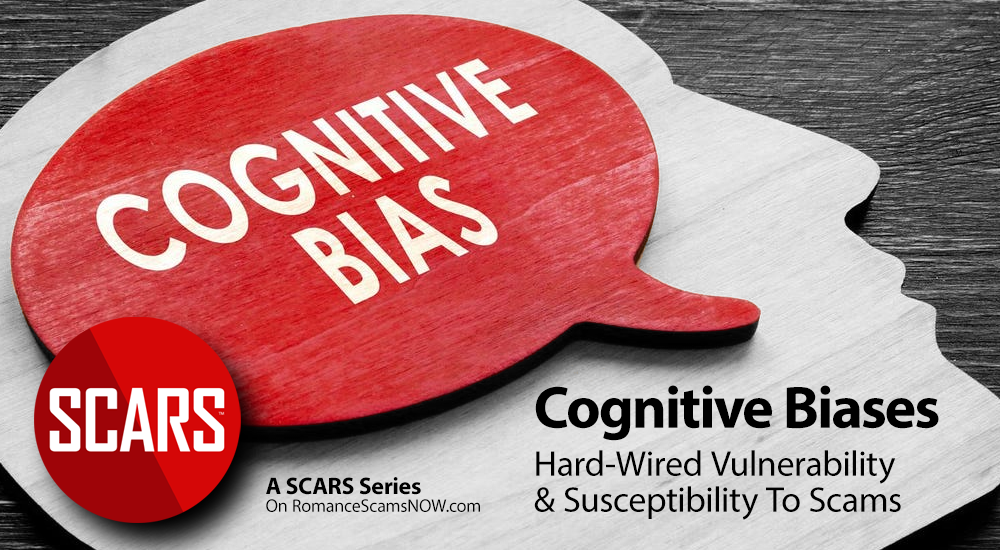

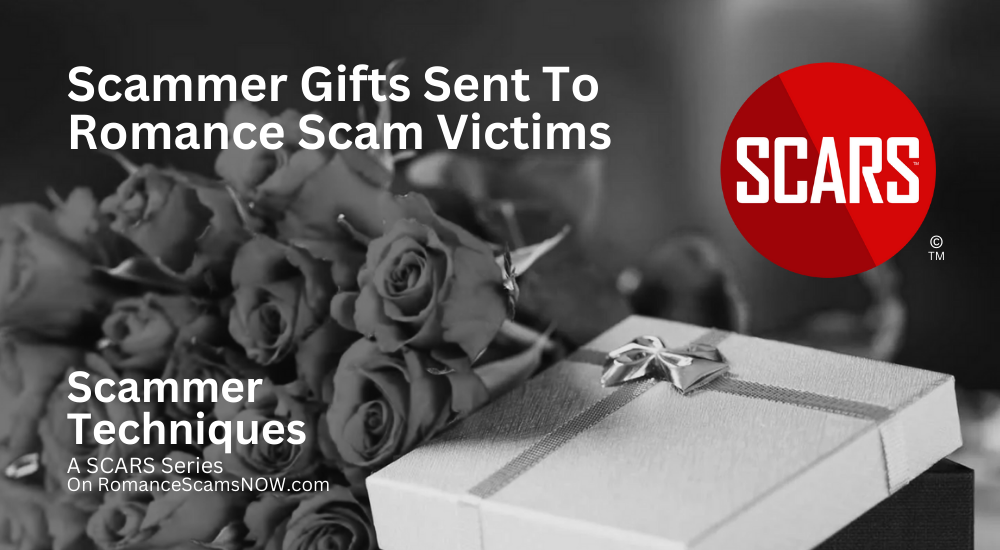
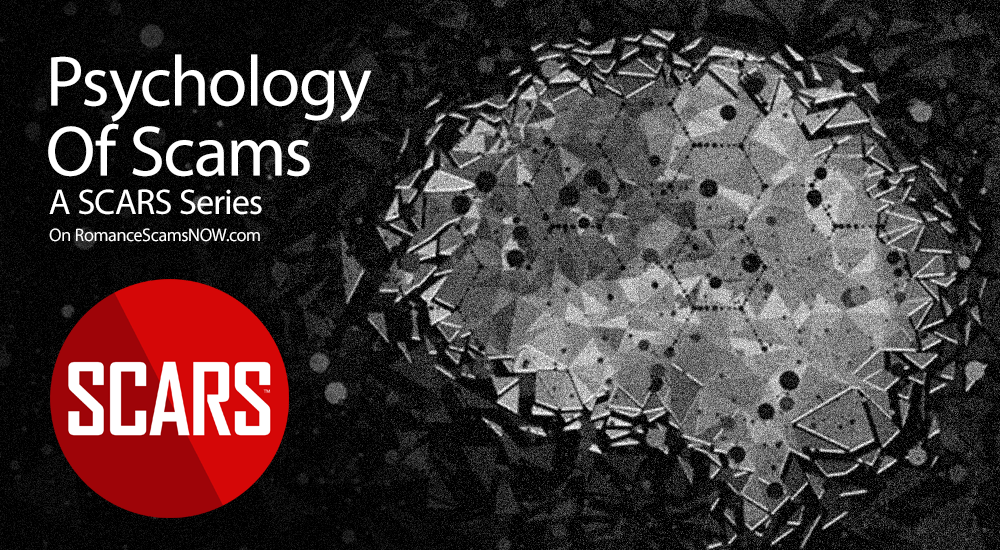
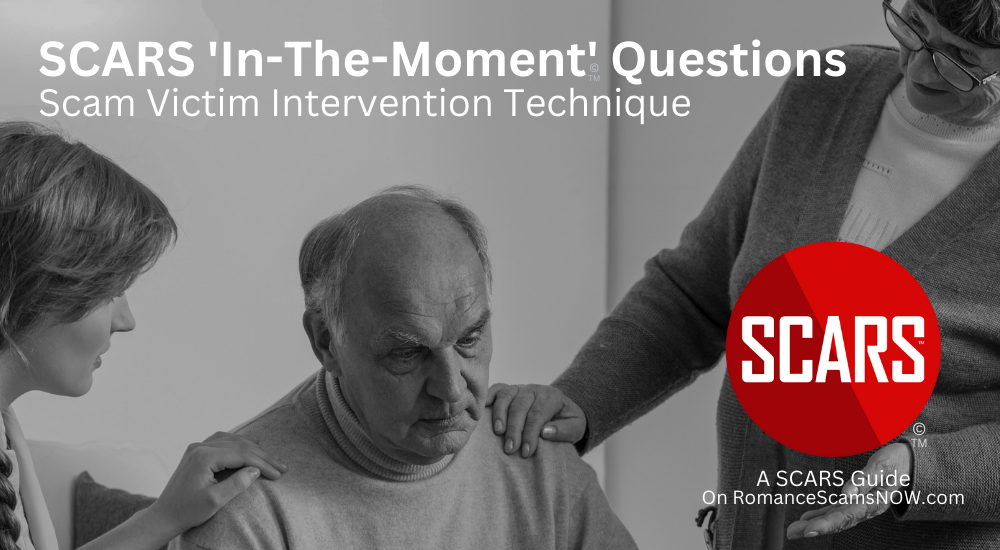
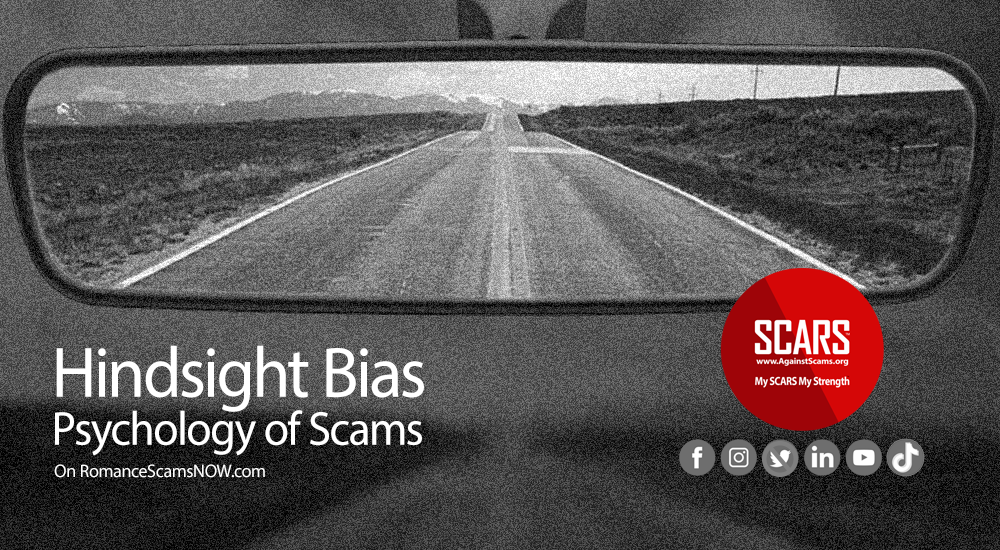
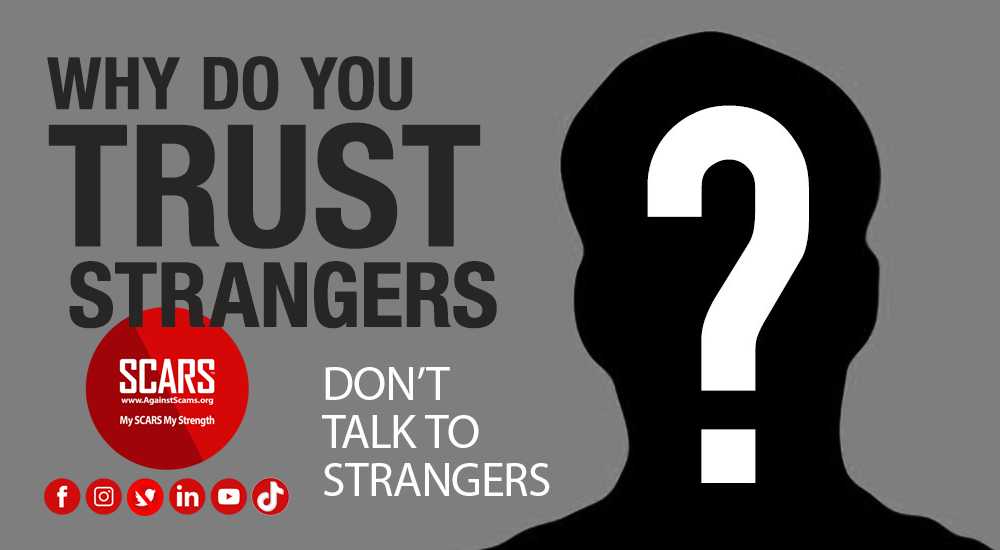





![An Example of How Scammers Use Emergency Scams - 2014 [UPDATED 2024] - on SCARS RomanceScamsNOW.com](https://romancescamsnow.com/wp-content/uploads/2014/06/emergency-scams.png)
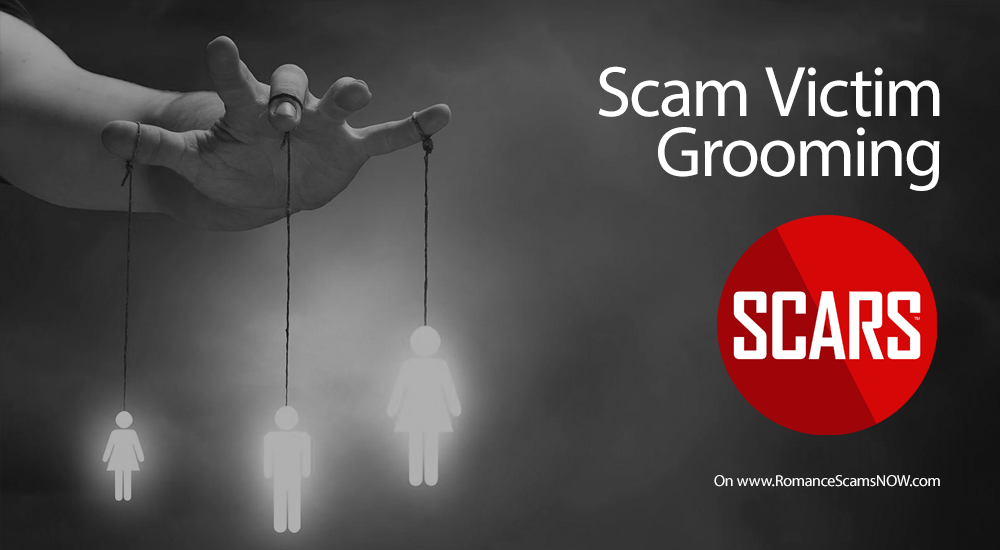

I’ve been corresponding with a girl (?) from Ghana for almost 2 years. Your articles definitely have helped me know she is a scammer, especially her fake pictures. Im having trouble acceptlng it , that she is not who she says. So instead of confronting her i look up another article here. Thank you.
Thank you for your comment. Yes, acceptance is a very hard thing, especially when you don’t have PROOF. Though you don’t need proof since their behavior is all you need. Men have the hardest time with scams, especially when they think about the fact that they are talking to men. If you lost money, report it to the police and get a report number, then talk to a victim’s advocate through the police department about victims’ counseling – it will help you to have someone local that you can talk to candidly. Unfortunately, men do not really participate in support groups. But you are welcome to come and join on of our groups – but you will need to completely break off all contact first. Here is the link: https://www.facebook.com/groups/SCARS.Avoidance.Information.Public.Group